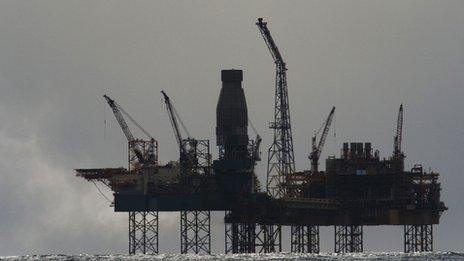Scottish independence: No nasty surprises for oil
- Published

The document appears to have listened to what the oil and gas industry wants
What difference would Scottish independence make to the UK's oil and gas sector?
One answer from the document published today by the Scottish government, and it's... not much.
That's deliberate. The document appears to follow a careful listening exercise by ministers and civil servants, hearing what the oil and gas industry wants, and concluding that what it most wants is the least possible change.
So if voters wish to create a separate Scottish state, the industry - "firmly neutral" on the issue - will adapt, as it does to political change and cross-border issues around the world. But what the sector loathes is unpredictable taxation.
The giant investments required to keep pumping hydrocarbons - £100bn is in the pipeline - are massively changed by small alterations to the tax rate, currently at 81% for older fields, and 62% for newer ones.
And Alex Salmond has given the oil firms as much reassurance as he can that they'll get predictability.
Is the tax burden on them too low or too high, a colleague asked him today? He thinks it's about right.
The paper includes ideas on how Norway and the Netherlands tax their offshore sectors slightly differently. But they're only ideas rather than pledges for change.
Bruising encounter
Likewise, there's a hint that an independent Scotland would want world-class safety standards. But it's less clear that they would differ from the current ones. There's no criticism of them, anyway.
Nor is it clear if Scotland would have its own inspection regime, or how that would mesh with either the one for the rest of the UK or with others around the North Sea.

George Osborne raided the offshore sector for an extra £2bn per year
For most of the section in today's publication about independence, it's hard to find much difference with the policy of the Department of Energy and Climate Change and the Treasury in London.
The key difference Mr Salmond would wish to highlight, however, is that Whitehall's track record on consistency and predictable taxation is not a good one.
There was a bruising encounter following the 2011 Budget, when George Osborne raided the offshore sector for an extra £2bn per year, and without any warning.
Industry leaders were furious, slamming the brakes on investment until the change was gradually and partially unwound. The Treasury had previous on this. When Gordon Brown was Chancellor, he also raided offshore oil and gas. Twice.
The Scottish government can say it hasn't given the sector any nasty surprises. It hasn't had the powers to do so. And with an oil economist at the helm in St Andrew's House, he knows how to talk their language. So on this issue, he's got an advantage.
The disadvantage, however, is that he needs the industry more than Whitehall does, and there's a risk that he is seen to be accepting whatever the industry wants.
Bonus tax
He's talking about oil and gas being a bonus rather than a necessity for Scottish independence. This has to do with Scotland contributing a fair share of taxation.
What it doesn't include is Scotland's higher spend per head. To deal with that, as things stand, an independent Scotland could only keep the deficit to manageable levels using oil and gas revenue.
The counter-argument? Things don't stand still. Supporters of independence aim for change, and faster growth in the rest of the economy, to reduce dependency on oil and gas revenue.
And one thing that certainly doesn't stand still is the tax take from oil and gas. It's highly volatile, and although it may see a rise due to a current boom in investment, reserves will surely deplete.
All the more reason for replacements for the sector as a generator of business and of employment - with or without independence, and not least for the north-east.
- Published23 July 2013
